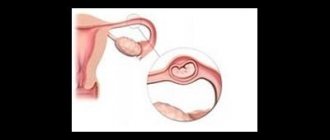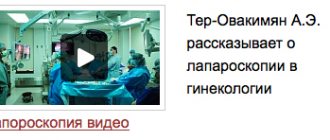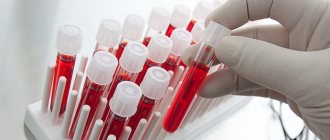It is no secret that pregnancy is a test for the female body: during this period, all organ systems work more intensely than usual. This also applies to the work of the thyroid gland, which alone provides hormones to both mother and child until the fetus develops its own endocrine system.
Snoring, apnea, insomnia or other problems? Contact the Sleep Medicine Center at the Rehabilitation Clinic in Khamovniki. We will definitely help you! Ask questions and schedule a consultation by phone.
Thyroxine and triiodothyronine are hormones necessary for the mother and literally vital for the baby growing in the womb. That is why the condition of insufficiency of thyroid hormones, called hypothyroidism, can make serious negative adjustments during pregnancy, in the health of the child and his mother.
Hypothyroidism during pregnancy: causes
Hypothyroidism is very common among pregnant women - every 10 women have it. At the same time, only one in 10 women has clinical manifestations. In others, hypothyroidism occurs hidden, even when the pregnant woman herself is not aware of it.
Among Russians, at least 35% experience iodine deficiency, and in some regions, such as the Krasnoyarsk Territory, the Republic of Sakha, Buryatia, Tyva, and the Perm Region, iodine deficiency is detected in 80% of the population. During pregnancy, the thyroid gland begins to work 30-50% more efficiently, and at the same time the need for iodine increases. If it is not satisfied, relative hypothyroidism develops.
Approximately 10% of pregnant women have antibodies to their own thyroid gland during examination, which indicates the presence of latent autoimmune thyroiditis. It leads to the gradual destruction of gland cells and a decrease in hormone synthesis. Even if in such women the levels of thyroxine and triiodothyronine remained normal outside of pregnancy, during pregnancy, against the background of an increased need for the synthesis of hormones, the thyroid gland cannot cope with this task, and hypothyroidism in pregnant women very often develops.
The third cause of hypothyroidism is previous surgery for thyroid disease. When thyroid tissue is excised, the number of functioning cells decreases. This provokes the development of deficiency, which manifests itself or intensifies under conditions of increased need for hormones during pregnancy.
Out of 100 women with hypothyroidism, 6-7 have congenital hypothyroidism. It is usually caused by a point gene mutation that is not usually inherited.
Thyroid diseases and pregnancy
A healthy baby is the cherished desire of all parents, without exception. For a favorable pregnancy, “harmony of hormones” is important, for which the thyroid gland is also responsible; it is not for nothing that it is called the “conductor” of the whole organism.
The thyroid gland produces important hormones - thyroxine and triiodothyronine. What are they responsible for? In general, there is no organ or system in the body that does not need them. Pathological processes in the thyroid gland can cause: infertility, menstrual irregularities, miscarriage, stillbirth, increased infant mortality. The physical, mental and intellectual development of the child largely depends on the normal functioning of this organ.
Thyroid diseases are 8 to 10 times more common in women than in men. Pregnancy itself can cause changes in a woman's thyroid function. A change in its function occurs already from the first weeks of pregnancy. This is the period when the fetus’s own thyroid gland has not yet begun to function, and the entire process of development of the unborn baby is ensured by the mother’s thyroid hormones. In other words, the thyroid gland of a pregnant woman feels a double load, because works on two organisms at once.
Thyroid hormones contain iodine. That's why we need it so much. With its deficiency, thyroxine and triiodothyronine cannot be produced in sufficient quantities. The only source of iodine for the child’s thyroid gland is the iodine that is in the mother’s blood. If there is not enough iodine in a pregnant woman’s diet, the thyroid gland sharply reduces the production of hormones, which negatively affects the development of the baby:
– under conditions of iodine deficiency in the 1st trimester of pregnancy, gross malformations of the nervous system are formed, leading to termination of pregnancy;
– in the 2nd trimester, the cerebral cortex is formed, and this is the basis of higher nervous activity, i.e. consciousness, behavior, thinking and intelligence; ⠀
– in the 3rd trimester, iodine is necessary for adequate functioning of the fetal thyroid gland. If this work is disrupted, the child suffers from congenital hypothyroidism.⠀
– iodine must be supplied to the child even after birth, since the nervous system continues to form. And if a nursing mother does not provide iodine to the baby, then there is nowhere else to get it.⠀
– the most severe consequences of iodine deficiency are cretinism and deafness, and consuming iodine after birth does not cure them.
Iodine deficiency remains the leading cause of preventable intellectual disability worldwide.
Iodine enters our body with food. The main sources of iodine are seaweed, seafood, eggs, turkey, green beans, and iodized salt. To compensate for the deficiency of this element, special iodine-containing preparations may be prescribed. The iodine requirement is no more than 200 mcg per day from the beginning of pregnancy until the end of breastfeeding. When preparing for pregnancy (or preconception preparation), it is optimal to start taking iodine supplements 3 months before the planned pregnancy. At the same time, it is necessary to control the total amount of microelement received during the preparation for pregnancy: with fortified foods, as part of multivitamin preparations. The maximum amount of iodine a woman receives from food, water and supplements should not exceed 500 mcg per day.
The presence of a thyroid disease in a woman, for which she is already receiving therapy, is not a contraindication for planning pregnancy, but the main condition for this is the reliable maintenance of euthyroidism (normal levels of thyroid hormones). All women with thyroid disease should consult an endocrinologist.
The most common thyroid diseases are:
- Hypothyroidism.
- Nodular goiter.
- Thyrotoxicosis (hyperthyroidism).
- Autoimmune thyroiditis.
- Thyroid cancer.
Hypothyroidism
Hypothyroidism is a condition caused by a long-term, persistent lack of thyroid hormones. The prevalence of hypothyroidism among pregnant women is 2 – 2.5%. When should you think about reducing thyroid function: in the presence of autoimmune thyroiditis, after surgical treatment or radioiodine therapy, treatment of hyperthyroidism, radiation therapy for head and neck cancer, use of certain psychotropic drugs, diseases of such parts of the brain as the pituitary gland and hypothalamus, presence of thyroid diseases in family, iodine deficiency.
10 clinical symptoms of hypothyroidism:
- Unexpected weight gain.
- Feeling tired, tired, drowsy.
- High cholesterol levels.
- Bad mood or irritability.
- Difficulty concentrating.
- Dry and flaky skin, deterioration of hair and nails.
- Constipation.
- Muscle pain.
- Irregular menstruation.
- Sensitivity to cold, chilliness of extremities.
Complications that arise during pregnancy with hypothyroidism in the mother:
- Increased risk of spontaneous abortion and stillbirth.
- High risk of developing arterial hypertension in pregnant women.
- Development of preeclampsia (swelling, increased blood pressure and impaired renal function in women).
- Increased risk of preterm birth.
- Increased risk of placental abruption and postpartum hemorrhage.
- Birth of low birth weight babies.
Treatment:
Replacement therapy is carried out with the drug levothyroxine. In women with pre-pregnancy hypothyroidism, thyroid-stimulating hormone (TSH) and free T4 levels are monitored every 8 to 10 weeks. If hypothyroidism is first detected in a woman during pregnancy and treatment is prescribed, free T4 and TSH are monitored every 4 to 8 weeks.
Pregnancy planning.
Compensated hypothyroidism is not a contraindication for planning pregnancy. The optimal TSH level before pregnancy is 0.4 – 2.0 mU/l. Therefore, in all women with hypothyroidism receiving levothyroxine sodium replacement therapy, the dose of the drug should be adjusted accordingly. TSH and free T4 levels are monitored every 8 weeks. 3–6 months before the planned pregnancy, you must start taking potassium iodide at a dose of 200 mcg/day.
Nodular goiter
The frequency of occurrence in pregnant women is 4% and is not a contraindication for planning pregnancy, with the exception of large nodular formations.
Most patients with nodules in the thyroid gland have no complaints. In rare cases, with significant size of tumor nodes, the following may occur:
- feeling of a lump in the throat;
- shortness of breath, sometimes there may be suffocation;
- deformation of the neck contour;
- persistent cough, hoarseness.
- swallowing disorder
It should be noted that, contrary to some beliefs, during pregnancy the risk of an increase in nodular formations is not so great. Like most pregnant women, patients are prescribed individual iodine prophylaxis with physiological doses of iodine. In any case, monitoring of thyroid function with determination of hormone levels in each trimester of pregnancy is indicated.
Pregnancy planning.
At the stage of pregnancy planning, women with suspected or presence of nodules in the thyroid gland should consult an endocrinologist who will conduct the following examinations:
- Examination of the neck and palpation of the thyroid gland and regional lymph nodes.
- Ultrasound examination of the thyroid gland (ultrasound).
- Ultrasound-guided fine-needle biopsy (if indicated).
- Determination of TSH and free T4 levels.
- Determination of antibodies to thyroid peroxidase (AT/TPO) according to indications: in the presence of autoimmune thyroiditis or suspicion of it.
Thyrotoxicosis
Thyrotoxicosis (hyperthyroidism) is a condition opposite to hypothyroidism, caused by an excess of thyroid hormones. Thyrotoxicosis during pregnancy occurs in 0.1% - 0.2% of pregnant women; its main cause is diffuse toxic goiter or Graves' disease.
10 clinical signs of hyperthyroidism:
- Weight loss or lack of weight gain adequate for the duration of pregnancy.
- Tremor (shaking hands), muscle weakness.
- Emotional lability: irritability and tearfulness, feelings of fear and anxiety, nervousness and increased excitability.
- Exophthalmos is a forward displacement of the eyeball (bulging eyes) and paralysis of the eye muscles of varying severity.
- Feeling hot, fever, sweating.
- Constant tachycardia more than 100 beats per minute, heart rhythm disturbance.
- There is a large difference between systolic (increase) and diastolic (decrease) pressure.
- Intense thirst, frequent and copious urination.
- Increased appetite, indigestion, unstable stool (frequent diarrhea).
- Changes in the skin - it becomes thin, warm and moist, hair - it becomes thinner and turns gray early, nails - separation of the nail plate from the nail bed.
If left untreated, thyrotoxicosis in a pregnant woman can cause:
- fetal malformations;
- miscarriages in early pregnancy and premature birth;
- birth of a child with underweight;
- neonatal thyrotoxicosis within 2–3 months after birth (tachycardia, growth retardation, increased bone age, goiter, etc.), requiring therapy (thyreostatics);
- preeclampsia (edema, increased blood pressure, impaired renal function),
- chronic intrauterine fetal hypoxia (oxygen starvation), fetoplacental insufficiency and retarded fetal growth and development,
- disruption of labor.
In the postpartum period, progression of thyrotoxicosis is usually observed.
Planning a pregnancy
It is desirable to radically cure thyrotoxicosis at the stage of pregnancy planning: removal of the thyroid gland followed by levothyroxine replacement therapy or a course of radioiodine therapy (after which pregnancy can be planned no earlier than 12 months later). When treated with thyreostatic drugs, stable remission occurs in approximately 10% of women. Therefore, until treatment or stable remission occurs, a woman needs to use contraception. Pregnancy must be planned.
Autoimmune thyroiditis
Autoimmune thyroiditis (AIT) is a chronic inflammatory process in the thyroid gland of an autoimmune nature.
This disease is diagnosed when elevated titers of antibodies to thyroid tissue are detected.
In case of AIT, pregnancy is not contraindicated with normal thyroid function and with compensated hypothyroidism. The recommended TSH level should be no more than 2.0 mU/L.
In women with AIT, hypothyroidism may manifest during pregnancy due to an additional stimulating effect on the thyroid gland. Monitoring of free T4 and TSH every 8 weeks is mandatory. If hypothyroidism occurs, replacement therapy with levothyroxine is indicated.
During pregnancy and during the period of breastfeeding, regardless of the functional state of the thyroid gland, iodine preparations are prescribed in a dose of 150 - 200 mcg/day.
Planning a pregnancy
The final stage of autoimmune thyroiditis is hypothyroidism, in which the level of hormones secreted by the thyroid gland sharply decreases. Therefore, planning pregnancy with AIT makes sense only in a state of euthyroidism, when the thyroid gland secretes a sufficient amount of hormones. Hormonal therapy is prescribed to a woman by her attending physician.
Thyroid cancer and pregnancy
Thyroid cancer (TC) occurs more often in women than in men. Moreover, it is most often diagnosed in women of reproductive age, so the issue of maintaining pregnancy in a patient with thyroid cancer is of great importance.
Numerous studies suggest that pregnancy does not have a significant effect on the course of thyroid cancer. In turn, thyroid cancer does not have a negative effect on the course of pregnancy and fetal development: there is no information about disruption or spontaneous termination of pregnancy or the development of fetal malformations.
Pregnancy with thyroid cancer is managed jointly with an oncologist.
Tactics for thyroid cancer during pregnancy.
If thyroid cancer is detected during an existing pregnancy, then the nature and sequence of treatment measures depends on the stage of the tumor, the age of the patient and the duration of pregnancy. The presence of differentiated thyroid cancer in a woman is not an indication for termination of pregnancy. In case of widespread tumors that extend beyond the thyroid gland, as well as in the presence of distant metastases, pregnancy is terminated, and then thyroid cancer is treated.
During pregnancy, it is possible to take 100 - 200 mcg of iodine per day for the normal functioning of the fetal thyroid gland.
Planning a pregnancy
After radical treatment for differentiated thyroid cancer (papillary, follicular), a woman can plan pregnancy after achieving stable euthyroidism (required level of thyroid hormones) during therapy with levothyroxine, if there are criteria for complete cure: TSH level in the blood < 1.0 ng/ml; absence of ultrasound or radiological signs of tumor recurrence and metastases; the absence of foci of accumulation of radioactive iodine during scintigraphy (a radiation diagnostic method that is used to assess the functioning of various organs and tissues) of the whole body and consultation with an oncologist.
If the patient belongs to the group of low or medium risk of tumor recurrence, then the minimum period after treatment (surgery or combined treatment with radioactive iodine) when pregnancy can be planned is at least 1 year. A woman from a high-risk group needs to wait 2–3 years and plan pregnancy only against the background of stable remission. Prophylactic administration of iodine preparations during the preconception period is not indicated.
Take care of your health and the health of your baby!
Interesting
- Healthy eating
- Preparing for the flu in the summer, especially during pregnancy
- Prelude to Conception
- Infertility: procedure and conditions for free provision of one IVF attempt
Hypothyroidism and pregnancy: symptoms
In 90% of cases, hypothyroidism in pregnant women is asymptomatic. In the remaining 10%, the woman complains of unmotivated fatigue, loss of strength, drowsiness, difficulty concentrating and remembering, and depression.
Hair may begin to fall out, the skin becomes dry and flaky, nails peel and break, and nail plates become uneven. Sometimes the voice changes - it becomes hoarse, rough. The nose gets stuffy, and sometimes hearing decreases.
A characteristic sign of hypothyroidism is swelling. They are most pronounced in the eyelid area, on the face, less so on the arms and legs. Pregnant women with hypothyroidism gain significant weight. Snoring occurs, which is often complicated by sleep apnea syndrome.
Pregnant women with hypothyroidism are at high risk of developing complications. Spontaneous abortions sometimes occur in the first trimester of pregnancy. Many women experience severe toxicosis. Throughout pregnancy, there are occasional threats of miscarriage. In the later stages, gestosis often occurs. Many pregnant women with hypothyroidism have iron deficiency anemia. After childbirth, these women are 8 times more likely to experience complications in the form of uterine bleeding.
Hypothyroidism and pregnancy. Consequences for the child
The effect of hypothyroidism on the fetus is serious: as already mentioned, in the early stages the child may die in the womb. Also, the fetus may suffer from hypoxia, since with hypothyroidism, fetoplacental insufficiency develops in 70% of cases. It also leads to the birth of low birth weight babies.
The fetus of a woman with hypothyroidism more often experiences oxygen starvation during childbirth, and the mother experiences weakness in labor, so complications during childbirth are likely to occur. Children born to mothers with hypothyroidism are very vulnerable to infectious diseases. In addition, all of them are themselves at risk for hypothyroidism.
Consequences for the fetus and the expectant mother
If TSH decreases due to excessive production of iodine-containing hormones, a hyperthyroid state is diagnosed. Untimely correction of hormonal levels leads to an acceleration of metabolism and rapid depletion of the energy reserves of the expectant mother’s body.
With low TSH, pregnancy can have consequences for the mother and fetus:
- early toxicosis with constant vomiting;
- threat of spontaneous miscarriage;
- placental abruption;
- fetoplacental insufficiency;
- gestosis (late toxicosis);
- premature birth;
- myocardial failure;
- anatomical abnormalities of the fetus;
- neonatal thyrotoxicosis;
- thyrotoxic crisis.
In 2.5% of patients with an excess of T3 and T4 in the blood, complications arise due to the transfer of autoantibodies to target cells into the child’s body. As a result, fetal malnutrition occurs, which is manifested by delayed growth and psychomotor development of the child after birth.
Thyrotropin deficiency due to pathologies in the hypothalamic-pituitary system leads to a decrease in iodine-containing hormones in the blood. In this case, low TSH levels during pregnancy will lead to:
- hypertension;
- fetal underdevelopment;
- threat of miscarriage;
- premature birth;
- early toxicosis;
- neonatal fetal death;
- placental insufficiency;
- weak labor activity;
- asphyxia of the fetus when passing through the birth canal.

Children born to mothers with endocrine disorders often exhibit memory and thinking disorders.
Hypothyroidism and pregnancy: diagnosis
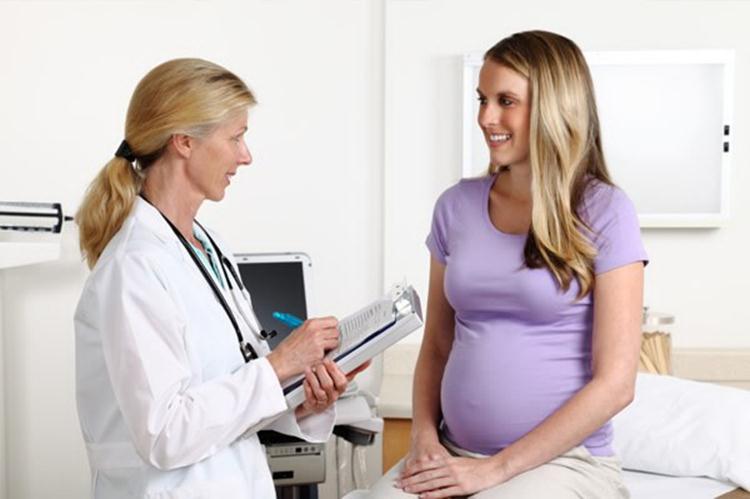
Obstetricians-gynecologists and therapists examining pregnant women should always be alert to hypothyroidism. If a disease is suspected, a hormonal test is performed to determine T4 (thyroid hormone) and TSH (pituitary hormone that controls the production of T4). If T4 levels are low and TSH is elevated, the diagnosis of primary hypothyroidism is obvious. This means that the condition is caused by a disease of the thyroid gland. If TSH is normal or below normal, and T4 is also reduced, hypothyroidism of central origin occurs, in which the functioning of the pituitary gland or hypothalamus is impaired.
If screening reveals changes characteristic of primary hypothyroidism, an additional blood test for antibodies to the thyroid gland (thyroid peroxidase) will be required. If it is positive, the problem lies in damage to the gland cells by one's own antibodies (Hashimoto's autoimmune thyroiditis).
Prevention of hypothyroidism
To prevent hypothyroidism, every woman planning a child should do the following:
- start taking iodine supplements (potassium iodide). A safe dosage is considered to be 200 mcg/day;
- take blood tests for: T4, TSH, antibodies to thyroid peroxidase to rule out hypothyroidism.
Remember that 10% of women have a hypothyroid condition. You can become pregnant with compensated hypothyroidism; the risk for the mother and fetus in this case is no higher than for women with normal thyroid function. In other cases, planning a child should be postponed - it is dangerous. That is why it is so important to detect the problem in time and choose treatment before pregnancy.
What to do if TSH is low when planning pregnancy
Before becoming pregnant, a woman is recommended to undergo diagnostics to determine her thyroid status and TSH level in the body. If there is a deficiency or excess of thyrotropin, they undergo a comprehensive examination, which includes:
If deviations are detected, preliminary treatment with radioactive iodine and antithyroid drugs is carried out. If necessary, a diet with a low iodine content is prescribed.
Pregnancy in women with pathologies of the thyroid gland and pituitary gland should be planned with the participation of an endocrinologist and obstetrician-gynecologist. The optimal period for conception is stable remission with a stable level of thyrotropin in the blood. To prevent complications, early registration at the antenatal clinic is required.
Hypothyroidism in pregnancy and sleep disorders
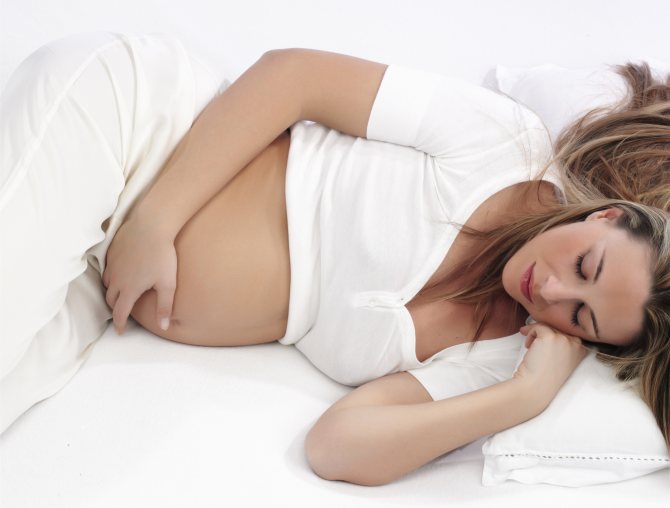
Hypothyroidism during pregnancy leads to excess weight gain and the development of tissue edema. All this causes snoring and obstructive sleep apnea syndrome, which causes prolonged breath holding during sleep and oxygen starvation of the body. Hypothyroidism itself poses a serious danger to the mother and fetus, and in combination with apnea syndrome it can lead to even more adverse consequences.
Sleep disorders inevitably affect the condition of the pregnant woman and the fetus. That is why, if you experience sleep disturbances even for a short period of time, you should seek medical help as soon as possible. You can get it at the Sleep Medicine Center at the Rehabilitation Clinic in Khamovniki, where a professional team of somnologists works. If necessary, outside specialists, including endocrinologists, are invited to the department for consultation. Thanks to this approach to the problem, it is possible to quickly determine the causes of poor health, eliminate sleep disturbances and quickly take measures to restore the health of the pregnant woman.
Snoring, apnea, insomnia or other problems? Contact the Sleep Medicine Center at the Rehabilitation Clinic in Khamovniki. We will definitely help you! Ask questions and schedule a consultation by phone.



